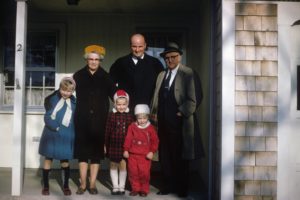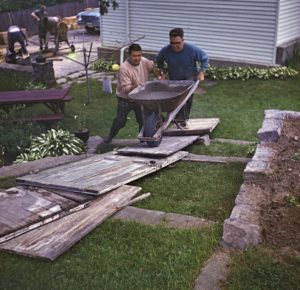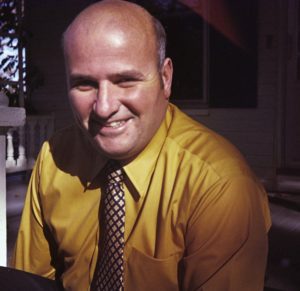These slides were taken by my father, William D. Copeland, Jr., over a twenty-two year period. Bill Copeland was born in 1931 in Boston, Massachusetts, the son of immigrants from Northern Ireland who came to America in the 1920s.  He attended Boston English High School, before going on to Boston University when it was still a streetcar school. He and my mother, Priscilla Murch, met while working at a church camp in New Hampshire. They married in 1954, and eventually had four children, of which I am the eldest. Their first home was in Framingham, Massachusetts, but when I was six, we moved to Melrose, Massachusetts, a suburb of Boston.
He attended Boston English High School, before going on to Boston University when it was still a streetcar school. He and my mother, Priscilla Murch, met while working at a church camp in New Hampshire. They married in 1954, and eventually had four children, of which I am the eldest. Their first home was in Framingham, Massachusetts, but when I was six, we moved to Melrose, Massachusetts, a suburb of Boston.
My father was a manufacturer’s representative for a company that sold fine engraved stationary and his territory covered Maine, New Hampshire, and the eastern part of Massachusetts. He was broadly curious and one of those people who seemed to known something about almost any topic that might come up in conversation. He was active in the churches he belonged to over the years, but beyond that, I don’t remember him belonging to any clubs or other organizations. He always had projects going on around the house and thanks to him, I learned the recipe for mixing concrete about the same time I learned the recipe for making brownies.  Our basement was the repository of many treasures–a pegboard full of tools, more than one printing press, later on, soap box derby cars in the making for my younger brother. My father was devoted to his family and intent on seeing that his daughters and son got a good education. His mantra was “Throw it up against the wall, and if it sticks, it sticks” and he championed us trying new things–probably because any interest we (and later our children) might pursue gave him something new to learn as well. He died of cancer in 2004.
Our basement was the repository of many treasures–a pegboard full of tools, more than one printing press, later on, soap box derby cars in the making for my younger brother. My father was devoted to his family and intent on seeing that his daughters and son got a good education. His mantra was “Throw it up against the wall, and if it sticks, it sticks” and he championed us trying new things–probably because any interest we (and later our children) might pursue gave him something new to learn as well. He died of cancer in 2004.
Over a decade after his death, I came into possession of my father’s slide collection. At the time I was only a few weeks out from a stem cell transplant and facing several months of extreme weakness and isolation as my immune system recovered. Perhaps it was all in the timing, but I was surprised how empowering it was for me to look at these old slides and rekindle long-forgotten family memories during that time of physical vulnerability.
Nostalgia often gets a bad rap. We think of it as sentimental pap that keeps us lodged in the past. But as I learned firsthand during the summer of 2015, nostalgia can also help us move forward. Since then, I have discovered that there is a whole body of research documenting the positive effects of nostalgia. According to work coming out of the University of Southampton in the UK, “nostalgia is now emerging as a fundamental human strength…and serves at least four key psychological functions: It generates positive affect, elevates self-esteem, fosters social connectedness, and alleviates existential threat.”
But for me, the bottom line is this: These slides taken are a chance for me to continue the conversation–this time in Kodachrome–with the father whom I both love and miss.
Judy Copeland

